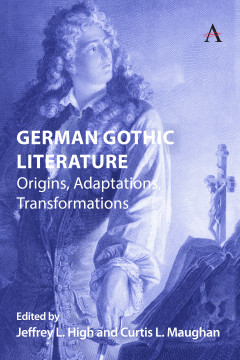German Gothic Literature
Origins, Adaptations, Transformations
Edited by Curtis Maughan & Jeffrey High
Other Formats Available:
- About This Book
- Reviews
- Author Information
- Series
- Table of Contents
- Links
- Podcasts
About This Book
The story of German gothic literature is that of the meteoric rise of a popular literary style that critics nonetheless considered an unwelcome intruder, often dismissing it as the pulpy mimicry of British forerunners and as a “plague ship of German letters” (Charles Maturin), from its beginnings with the German art ballad or Kunst ballade of Herder, Goethe, Bürger, and Hölty in the 1770s and 1780s to the gothic prose works of Schiller, Goethe and Kleist, et al. In particular, the German novella was the object of some suspicion, and, as Schiller complained of his gothic bestseller Der Geisterseher in 1788, the prose author was considered the unloved, “half-brother of the poet.” Kleist was ashamed to be associated with the disreputable genre, deriding the tendency of late-eighteenth-century literature toward stories about “knights with ghosts.” Focusing on its gothic character, no less an authority than Coleridge dismissed German Sturm und Drang and Romantic literature as merely derivative of the gloomy works of Young, Hervey, Richardson and Walpole. In her novel Northanger Abbey (1818), Austen characterizes the 1790s as a decade of “horrid” novels so stereotypically gothic and German that its most popular works constitute self-parodies on both counts. Despite the English roots of gothic literature touched on above and its increased prominence in England from 1790–1820, by the 1820s, gothic tales were so clearly established as “German Stories”—thus the title of a three-volume British collection of 1826—that Poe felt the need to reclaim the genre for all humanity in 1839: “I maintain that terror is not of Germany, but of the soul […].” The rest is literary history: gothic literature, and in particular German gothic short prose literature, has proven to be among the most resonant hypotexts, adapted and re-adapted in Anglo-American and European literature and film to the present day. This volume seeks to reevaluate German gothic literature after the wave of publications on the subject that renewed scholarly interest in these texts in the first decades of the twenty-first century.
Reviews
Author Information
Jeffrey L. High received his PhD from the University of Massachusetts, Amherst and is Professor of German Studies at California State University, Long Beach, as well as Guest Professor at the German Summer School of the Pacific.
Curtis L. Maughan received his PhD from Vanderbilt University and is the Director of the World Languages and Digital Humanities Studio at the University of Arkansas, where he also serves as a Teaching Assistant Professor of World Languages and Digital Technology.
Series
Anthem Studies in Gothic Literature
Table of Contents
Links
Stay Updated
Information
Latest Tweets



